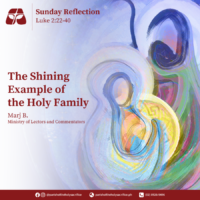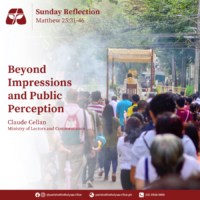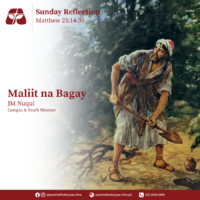Sunday Gospel Reflection
26th Sunday in Ordinary Time
Luke 16:19-31 | September 25, 2022
Is being rich a sin?
T. Rex Paras
Ministry of Lectors and Commentators
The rich man and the poor man met the same fate—death. However, why was the poor man, Lazarus, “carried away by angels to the bosom of Abraham,” while the rich man was sent to the netherworld, “where he was in torment?” Are the poor guaranteed a place in heaven, whereas the rich are doomed to go to hell? Is today’s Gospel (Luke 16:19-31) an illustration of what Jesus meant when he said, “Blessed are you who are poor, for the kingdom of God is yours?” (Lk 6:20)
Pope Francis himself has underscored several times that he wants our Church to be a Church of and for the poor. Such direction is not novel, and the idea is definitely not originally from the Pope. The Pope is simply taking his cue from the teachings of Jesus. However, make no mistake, neither Jesus nor Pope Francis is glorifying poverty.
Defined simply, being poor is not having enough resources to meet the most basic of needs such as food, clothing, and shelter. Poverty is hunger. Poverty is lack of clothing and shelter. Poverty is getting sick and not being able to avail oneself of proper medical care. Surely, Jesus and Pope Francis do not mean for us to live in such dire circumstances.
It is quite easy to look at the Sunday Gospel as an indictment against the rich. Even the verses of the Responsorial Psalm (Psalm 146:7, 8-9, 9-10) show the Lord’s partiality for the poor: “The Lord sets captives free / The Lord gives sight to the blind / The Lord raises up those who were bowed down / The fatherless and the widow he sustains.” Should we, therefore, stop storing wealth in order to enjoy God’s favor? Should we stop aspiring for a comfortable life in order to ensure our entry into the kingdom of God?
To better understand the Gospel, we turn to the prophet Amos in the First Reading (Amos 6:1a, 4-7). Our readings today remind us of the very beautiful and carefully thought-out structure of the Liturgy of the Word of the Holy Mass. The readings proclaimed should not be taken in insolation but should be understood in conjunction with one another. Today, for example, the plight of the rich man in Luke’s Gospel is better explained if we consider, too, the abominable behavior of the characters to whom Amos addresses his so-called third woe.
Amos relates how “the Lord the God of hosts” is repulsed by those “[l]ying upon beds of ivory, stretched comfortably on their couches…. They…anoint themselves with the best oils; yet they are not made ill by the collapse of Joseph!” This is what “the complacent in Zion” and the “rich man who dressed in purple garments and fine linen and dined sumptuously each day” have in common. Apathy. Indifference.
Like those in the First Reading who could not care less about the collapse of Joseph, the rich man paid no attention to Lazarus who was lying at the rich man’s door, “covered with sores, who would gladly have eaten his fill of the scraps that fell from the rich man’s table.” The rich man was not taken to task because he was rich, but because he did not do anything for Lazarus who was a stone’s throw away from him. The rich man saw closely the sufferings of Lazarus, but he did not lift a finger to help. His inaction was made worse by the fact that being rich, he had the means to help Lazarus. He had the resources, but he chose to ignore Lazarus. Or, to borrow words from our Second Reading (1 Timothy 6:11-16), the rich man failed to “pursue righteousness, devotion, faith, love, patience, and gentleness.”
Amos, in the Old Testament, warned the wealthy for their complacency, i.e., their lack of concern for the needy and the less fortunate around them. Jesus, in the New Testament, fortifies the lesson with The Parable of the Rich Man and Lazarus, a story that reverberates to this day. Let us pray for the grace to keep our eyes open, in the midst of working hard to achieve a comfortable life, to the plight of our neighbors whom we are supposed to love as we love ourselves and serve using the example that Jesus has given us.


